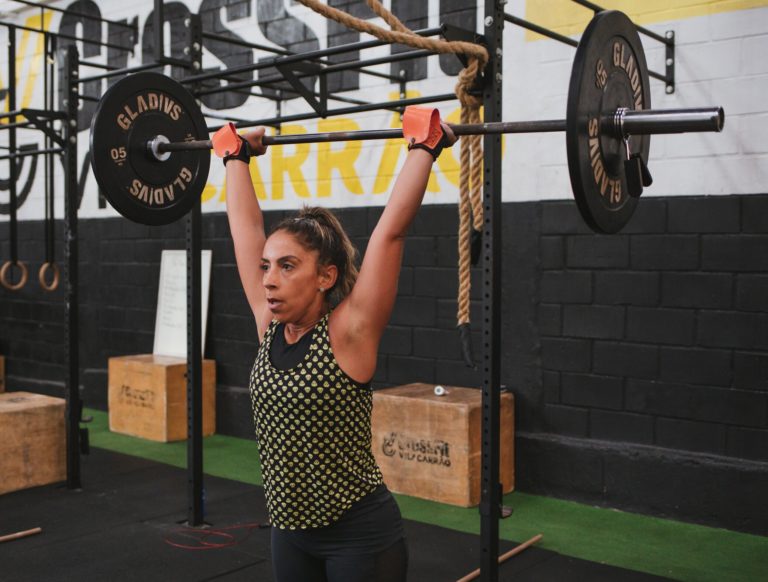Short Answer: Depending on your goals, CrossFit training and nutrition habits can be adjusted to produce a variety of changes to your body — all of which are beneficial.
Ask a Coach: How Will My Body Change With Regular CrossFit Training?
June 27, 2023
CrossFit will produce a multitude of positive changes in your body, including increased strength, endurance, flexibility, balance, and power, which will result in overall improvements in your health. When you train at a CrossFit affiliate under a credentialed coach, workouts are tailored to meet you at your fitness level. This ensures you are performing movements safely and at an intensity level that is right for you. Through a combination of functional movements, varied exercises, repetition ranges, distances, and durations, your body undergoes a remarkable transformation — including changes in body composition that can help you reach your goals.
We’ll often hear from someone interested in starting CrossFit that they “don’t want to get bulky.” The illusion that regular CrossFit training on its own will result in someone becoming “bulky” is just that — an illusion. In truth, gaining significant muscle mass requires a precise prescription of exercise volume and nutritional habits that will not happen accidentally or by attending CrossFit classes once a day and eating a clean diet. That said, CrossFit can be utilized to help you gain muscle mass if that is your goal. Similarly, CrossFit is beneficial to someone hoping to lose weight rather than gain.
By engaging in high-intensity training across different workout times like we do in CrossFit, you’ll improve your metabolic flexibility, which enables your body to more efficiently use carbohydrates and fats to fuel exercise and recovery. An improvement in metabolic flexibility will ensure your body is fueled properly to perform well while also reducing your reliance on carbohydrates for energy and freeing up fat as fuel — meaning you’ll be more efficient and effective at burning fat, rather than carbohydrates, which is ideal for weight loss. The combination of improved performance and metabolic health yields a myriad of health benefits, including improved body composition, enhanced blood lipid profile, better blood sugar control, lower resting heart rate, improved blood pressure, and a range of many other health metrics that aid in weight loss.
 Changes in your body cannot be addressed without talking about nutrition. Incorporating good nutrition will augment the transformative effects of the CrossFit program, which allows you to tailor your results to align with your specific goals. This involves following a CrossFit workout regimen while prioritizing whole, natural foods as the bulk of your diet. The nourishment of high-quality protein, carbohydrates, fats, vitamins, and minerals will support your workouts and facilitate effective recovery and minimize soreness. It is during the recovery phase where the body repairs itself, creating stronger muscles and more efficient cardiovascular and metabolic systems.
Changes in your body cannot be addressed without talking about nutrition. Incorporating good nutrition will augment the transformative effects of the CrossFit program, which allows you to tailor your results to align with your specific goals. This involves following a CrossFit workout regimen while prioritizing whole, natural foods as the bulk of your diet. The nourishment of high-quality protein, carbohydrates, fats, vitamins, and minerals will support your workouts and facilitate effective recovery and minimize soreness. It is during the recovery phase where the body repairs itself, creating stronger muscles and more efficient cardiovascular and metabolic systems.
Food intake is another crucial component to assess when addressing changes in your body. By measuring your food quantities and considering the ratios of carbohydrates, proteins, and fats, you can customize your nutrition plan to achieve goals such as body-fat reduction or lean muscle gain. Remember, bulking up or getting too lean is not the default result of CrossFit training unless you are deliberately following a dietary program directed at achieving these goals. This is the beauty of performing the full expression of CrossFit: You have the power to adjust and manipulate your nutrition and workout variables in order to achieve your personalized performance, health, and physique objectives.
About the Author
 Michael Giardina started CrossFit in 2005. He has worked as a trainer at a CrossFit affiliate and as a CrossFit Seminar Staff Flowmaster and Content Supervisor. He has competed at the CrossFit Games and served as a CrossFit Games Head Judge. He is a Certified CrossFit Coach (CF-L4), has a Master of Science in exercise physiology, a Master of Public Health, and works as CrossFit’s Senior Manager of Health Education.
Michael Giardina started CrossFit in 2005. He has worked as a trainer at a CrossFit affiliate and as a CrossFit Seminar Staff Flowmaster and Content Supervisor. He has competed at the CrossFit Games and served as a CrossFit Games Head Judge. He is a Certified CrossFit Coach (CF-L4), has a Master of Science in exercise physiology, a Master of Public Health, and works as CrossFit’s Senior Manager of Health Education.